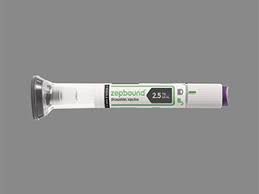Zepbound (tirzepatide) is an FDA-approved prescription medication used to support weight loss and treat obstructive sleep apnea (OSA) in certain adults. Administered via a once-weekly injection, Zepbound works by suppressing appetite and slowing digestion to help manage weight over the long term.
Zepbound is a brand-name drug that contains tirzepatide, a medication that mimics natural hormones to regulate appetite and blood sugar. It is currently only available in brand-name form, with no generic alternative.
Zepbound is delivered as a liquid solution in prefilled single-dose injection pens or vials for subcutaneous (under-the-skin) use.
Boxed Warning: Zepbound carries a boxed warning due to the potential risk of thyroid tumors. See the section below: “What to Know Before Starting Zepbound” for important safety considerations.
Zepbound is prescribed in combination with a reduced-calorie diet and increased physical activity for:
- Adults with obesity (BMI ≥30), or
- Adults who are overweight (BMI ≥27) and have at least one weight-related condition, such as:
- Type 2 diabetes
- High blood pressure
- High cholesterol
- Heart disease
- Obstructive sleep apnea
Additionally, Zepbound is approved to treat moderate to severe obstructive sleep apnea in adults with obesity.
Zepbound helps reduce food intake by:
- Suppressing appetite
- Delaying stomach emptying
These combined effects lead to a feeling of fullness sooner and for longer, supporting gradual, sustained weight loss and improved sleep apnea symptoms over time.
Zepbound is not recommended if you:
- Take other medications containing tirzepatide (e.g., Mounjaro)
- Use other GLP-1 receptor agonists like semaglutide (Ozempic, Wegovy) or liraglutide (Saxenda, Victoza)
- Are you currently using other weight loss drugs or supplements
- Have a history of pancreatitis
The cost of Zepbound varies depending on your insurance coverage, treatment plan, and pharmacy. Here are a few ways to manage costs:
- Optum Perks: Compare prices and access savings coupons (note: these can’t be combined with insurance).
- Manufacturer’s Savings Card: Eligible patients may receive discounts.
- Pharmacy Assistance: Ask your pharmacist about other cost-saving programs.
Like most medications, Zepbound can cause both mild and serious side effects. Not everyone will experience these, and their severity can vary.
- Nausea or vomiting
- Diarrhea or constipation
- Bloating, gas, or burping
- Indigestion or heartburn
- Fatigue or dizziness
- Injection site reactions (redness, itching, rash)
- Mild allergic reactions
- Temporary hair thinning
Most mild side effects subside within a few weeks. Contact your doctor if they persist or worsen.
- Severe nausea or diarrhea leading to dehydration or kidney problems
- Pancreatitis
- Gallbladder issues (e.g., gallstones)
- Low blood sugar, especially when used with insulin or sulfonylureas
- Thyroid cancer risk (boxed warning)
- Severe allergic reactions
- Suicidal thoughts or behavior (rare, but possible)
Seek immediate medical attention if you experience difficulty breathing, swelling of the face or throat, or severe abdominal pain.
Zepbound injection pens and vials are available in the following doses:
- 2.5 mg / 0.5 mL
- 5 mg / 0.5 mL
- 7.5 mg / 0.5 mL
- 10 mg / 0.5 mL
- 12.5 mg / 0.5 mL
- 15 mg / 0.5 mL
- Start: 2.5 mg once per week for 4 weeks
- Step-up: 5 mg weekly for the next 4 weeks
- Adjust: Your doctor may increase your dose in 2.5 mg increments, up to 15 mg max per week
- Typical long-term maintenance dose: 10 mg or 15 mg once per week
- Inject under the skin (abdomen, thigh, or upper arm)
- Rotate injection sites weekly to avoid irritation
- Use each pen or vial only once
- You can inject with or without food, at any time of day—just stick to the same day each week
Store in the refrigerator, or at room temperature (up to 86°F) for a maximum of 21 days. Do not freeze.
- Inject as soon as you remember, within 4 days
- If more than 96 hours have passed, skip the missed dose
- Resume your regular schedule—never double up
- Not recommended during pregnancy due to the risk of harm to the fetus
- Safety while breastfeeding is unknown
- Use non-hormonal birth control if you’re of childbearing potential, as hormonal contraceptives may be less effective with Zepbound.
Zepbound may delay the absorption of other oral medications. Common interactions include:
| Drug Type | Examples |
|---|---|
| Birth control pills | Junel, Yaz |
| Insulin | Humalog, Lantus |
| Sulfonylureas | Glipizide, Glimepiride |
| Blood thinners | Warfarin |
Always inform your doctor about all medications, supplements, and herbal products you’re taking.
Yes, but caution is advised. While studies show similar side effects across age groups, older adults are more likely to have other health conditions or take interacting medications.
Avoid Zepbound if you or a family member has a history of:
- Medullary thyroid cancer
- Multiple endocrine neoplasia syndrome type 2 (MEN 2)
Watch for symptoms like neck lumps, persistent hoarseness, or trouble swallowing or breathing.
Zepbound may not be suitable if you have:
- Gastroparesis or severe digestive issues
- Kidney disease
- Diabetic eye disease
- Depression or suicidal thoughts
- History of severe allergic reactions to similar drugs
If you inject too much Zepbound:
- Call your doctor or the Poison Help Line at 800-222-1222
- For severe symptoms, call 911 or go to the nearest emergency room immediately
Several other medications are used to support weight loss:
- Semaglutide (Wegovy, Ozempic)
- Liraglutide (Saxenda)
- Tirzepatide (Mounjaro)
- Orlistat (Alli, Xenical)
- Phentermine (Adipex-P)
- Phentermine/topiramate (Qsymia)
- Bupropion/naltrexone (Contrave)
Best Twitter Viewer Tools: Seamless Browsing Without an Account
- Zepbound and Mounjaro both contain tirzepatide, but only Zepbound is FDA-approved for weight loss.
- Ozempic contains semaglutide and is FDA-approved for type 2 diabetes and cardiovascular risk reduction.
Long-term risks are currently considered low, but research is ongoing. Talk to your doctor about any concerns.
You may begin seeing results within a few weeks, but weight loss and sleep apnea improvements usually occur over several months.

